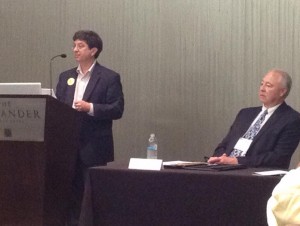Here are links, annotated, mentioned in my portion of a Panel on Ethics at the 39th annual conference of the National Society of Newspaper Columnists, in Indianapolis.

These were prepared with the assumption the room would have a projector etc. Wrong. I had a Plan B — always have a Plan B as well as a C — so the program went well. I did not have slides but websites to show. Links to them might be of interest to those attending and others.
The other panelist was Steve Key, executive director of Indiana’s Hoosier State Press Association. He is well-versed in all sorts of journalistic concerns — he’s an attorney and a former news reporter — and a clear and engaging speaker.
Here is my bio from the conference program: “Ben Pollock has had a 3 1/2-decade journalism career, including stints as columnist, editorial page editor, copy editor, metro editor, reporter and page designer, mainly in newspapers. As a freelancer, he has been a reporter and editor as well as a web designer and content manager. Ben was 2010-12 NSNC president and now serves as the society’s director of media. He was 2014-15 interim assistant director of the new University of Arkansas Center for Ethics in Journalism. He lives near the Fayetteville campus with his wife.”
OK, let’s watch a little TV
After Key opened with a general, historical approach to news judgment and ethics, I explained my preference of using recent examples in presentations. Lenore Skenazy was my choice, as she’d gotten in some hot water earlier this month.
From The Daily Show, Comedy Central, June 3, 2015. “Jordan Klepper examines free-range parenting, which allows children to be independent without fear of unknown dangers.”
Columnist Lenore Skenazy takes credit for coining “free-range kids.”
- Her website is Free-Range Kids.
- Creators syndicates her column.
Shortly after the same time the Jon Stewart show aired, a column Skenazy published in the Libertarian magazine Reason took heat when media news aggregator Jim Romenesko posted a link to it, and Skenazy added details in a follow-up.
- “11-Year-Old Boy Played in His Yard. CPS Took Him, Felony Charge for Parents — An Interview with Two Parents Who Lost Their Kids … Over Nothing.”
- “Trouble Not Over for Florida Parents of 11-Year-Old Taken in CPS Dispute — It’s An Unbelievable Story. But It’s True.”
The pieces were about a Florida family — a working mom, working dad, a 4-year-old boy and the above 11-year-old brother. The parents weren’t home from their jobs one day and the older boy accidentally was locked out of the house, so he shot baskets in the yard about 90 minutes. A neighbor phoned it in. The two boys were put in foster care. The parents won the civil case, but criminal charges, for neglect, are pending.
Early comments to Jim Romenesko’s post on Skenazy’s columns came from people who did not believe the story — because she did not name the family or the city. Other commenters noted a broad Google search could bring up enough of these details to prove it’s real. Other defenders noted the children’s general privacy privilege, not to mention regulations on privacy in juvenile and family legal matters.
If curious for the context instead of the above summary, find the Facebook thread of Romenesko’s linked here.
Lenore Skenazy has a website and now a show on the Discovery-Life cable channel called World’s Worst Mom. I’d note Skenazy’s credentials. She has them. She’s been a reporter and a columnist for some three decades in New York-based media. If that’s not enough, what is? OK, she’s a Yale graduate. Then what?
My point to columnists: What’s it mean for us, even if we’re not blogging advocates for something as important as sound-and-safe child-rearing practices?
Caution: When thinking about journalism ethics I’ve found in teaching it that it’s easy to confuse that with the ethics of the story. We can do “free-range kids” at lunch or in the hospitality suite.
My points
When it was just bloggers, over a decade ago, it was called Citizen Journalism. But with social media and easy stills and videos from our cell phones, let’s face it, we’re all journalists now. Ethics may be the good sportsmanship of commentary and fact-reporting, but ethics is also very practical.
Second, you could reduce all journalism ethics to the “Do Right” rule. Because that sort of maxim never is enough, a first expansion is the newly revised SPJ Code of Ethics. Besides, other writers, at any stage of amateur to professional, have tread this path before. Let’s learn from them.
Whether you’re a Watchdog Columnist or on the Erma Bombeck end of the Mom Blog continuum — advocate Lenore Skenazy is the other, advocacy, end of family columns — Journalism Ethics comes down to Respect:
- Respect for yourself, and what you’re trying to accomplish.
- Respect for the interview subjects you write about — courtesy, compassion and honor.
- And Respect for your audience. If you violate ethics once to have a grab on a really good story, sure it might go viral, but once you’re outed, and you eventually will be, they won’t come back. The audience will not respect your writing because they can’t trust your Ethics. You did not Do Right.
Resources
- Hand-out of the newly revised (fall 2014) Code of Ethics of the Society of Professional Journalists.
- We have our own, a Code of Conduct of the National Society of Newspaper Columnists.
- tinyurl.com/EthicsCodes, which I put together before I became a freelance ethicist.

2 replies on “A Panel on Ethics for Columnists, Other Writers”
[…] Pollock — “A Panel on Ethics for Columnists, Other Writers” — Brick: Muse on […]
Ben, a great online wrap-up of a great, educational, and thought-provoking panel discussion.